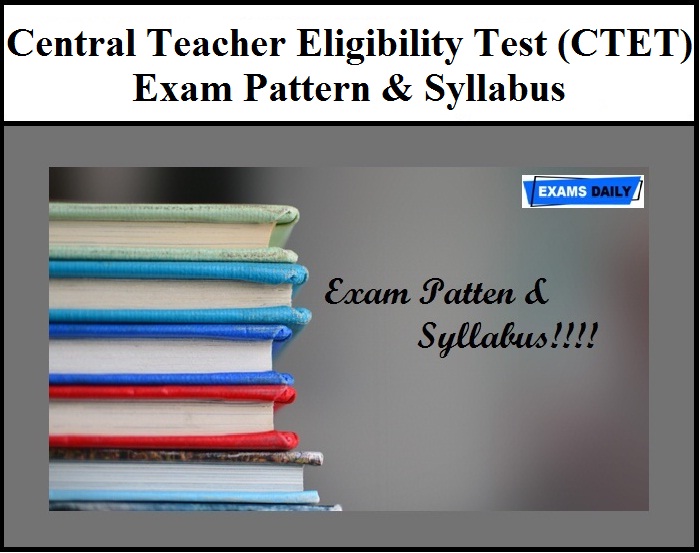Central Teacher Eligibility Test (CTET) Exam Pattern & Syllabus
Central Board of Secondary Education (CBSE) has released the Notification for Central Teacher Eligibility Test (CTET). Applicants are invited to apply for the posts. CBSE has released examination Date of CTET 2019 will be conducted on 07-07-2019. Candidates can apply through online from 05.02.2019 to 05.03.2019.
Official Notification
Central Teacher Eligibility Test (CTET) Exam Pattern & Syllabus is given below go, through the topics, to have an idea of the difficult subjects. Then candidates can plan a schedule for your preparation as per the syllabus. Here is the Exam Pattern & Syllabus for Central Teacher Eligibility Test (CTET).
Scheme of Exam(Pattern)
All questions in CTET will be Multiple Choice Questions (MCQs), with four alternatives out of which one answer will be correct. Each carrying one mark and there will be no negative marking.
There will be two papers of CTET.
(i) Paper I will be for a person who intents to be a teacher for classes I to V.
(ii) Paper II will be for a person who intents to be a teacher for classes VI to VIII.
Note: A person who intents to be a teacher for both levels (classes I to V and classes VI to VIII) will have to appear in both the papers (Paper I and Paper II).
Paper I (for Classes I to V) Primary Stage:
Duration of examination-Two-and-a-half hours Structure and Content (All Compulsory)
| Subject | Number of Questions | Total Marks |
| Child Development and Pedagogy (Compulsory) | 30 | 30 |
| Language I (Compulsory) | 30 | 30 |
| Language II (Compulsory) | 30 | 30 |
| Mathematics | 30 | 30 |
| Environmental Studies | 30 | 30 |
| Total | 150 | 150 |
Paper II (for Classes VI to VIII) Elementary Stage :
Duration of examination – Two-and-a-half hours Structure and Content (All Compulsory)
| Subject | Number of Questions | Total Marks |
| Child Development and Pedagogy (Compulsory) | 30 | 30 |
| Language I (compulsory) | 30 | 30 |
| Language II (compulsory) | 30 | 30 |
| Mathematics and Science (for Mathematics and Science teacher) | 60 | 60 |
| Social Studies/Social Science (for Social Studies/ Social Science teacher | 60 | 60 |
| Total | 150 | 150 |
Indicative Syllabus for Examination
Paper I (for Classes I to V) Primary Stage:
I. Child Development and Pedagogy
a) Child Development (Primary School Child)
- Concept of development and its relationship with learning
- Principles of the development of children
- Influence of Heredity & Environment
- Socialization processes: Social world & children (Teacher, Parents, Peers)
- Piaget, Kohlberg and Vygotsky: constructs and critical perspectives
- Concepts of child-centered and progressive education
- Critical perspective of the construct of Intelligence
- Multi-Dimensional Intelligence
- Language & Thought
- Gender as a social construct; gender roles, gender-bias and educational practice
- Individual differences among learners, understanding differences based on diversity of language, caste, gender, community, religion etc.
- Distinction between Assessment for learning and assessment of learning; School-Based Assessment, Continuous & Comprehensive Evaluation: perspective and practice
- Formulating appropriate questions for assessing readiness levels of learners; for enhancing learning and critical thinking in the classroom and for assessing learner achievement.
b) Concept of Inclusive education and understanding children with special needs
- Addressing learners from diverse backgrounds including disadvantaged and deprived
- Addressing the needs of children with learning difficulties, ‘impairment’etc.
- Addressing the Talented, Creative, Specially abled Learners
c) Learning and Pedagogy 10 Questions
- How children think and learn; how and why children ‘fail’ to achieve success in school
performance. - Basic processes of teaching and learning; children’s strategies of learning; learning as a social activity; social context of learning.
- Child as a problem solver and a ‘scientific investigator’
- Alternative conceptions of learning in children, understanding children’s ‘errors’ as significant steps in the learning process.
- Cognition & Emotions
- Motivation and learning
- Factors contributing to learning – personal & environmental
II. Language
a) Language Comprehension
Reading unseen passages – two passages one prose or drama and one poem with questions on comprehension, inference, grammar and verbal ability (Prose passage may be literary, scientific, narrative or discursive)
b) Pedagogy of Language Development
- Learning and acquisition
- Principles of language Teaching
- Role of listening and speaking; function of language and how children use it as a tool
- Critical perspective on the role of grammar in learning a language for communicating ideas verbally and in written form
- Challenges of teaching language in a diverse classroom; language difficulties, errors and disorders
- Language Skills
- Evaluating language comprehension and proficiency: speaking, listening, reading and writing
- Teaching- learning materials: Textbook, multi-media materials, multilingual resource of the classroom
- Remedial Teaching

